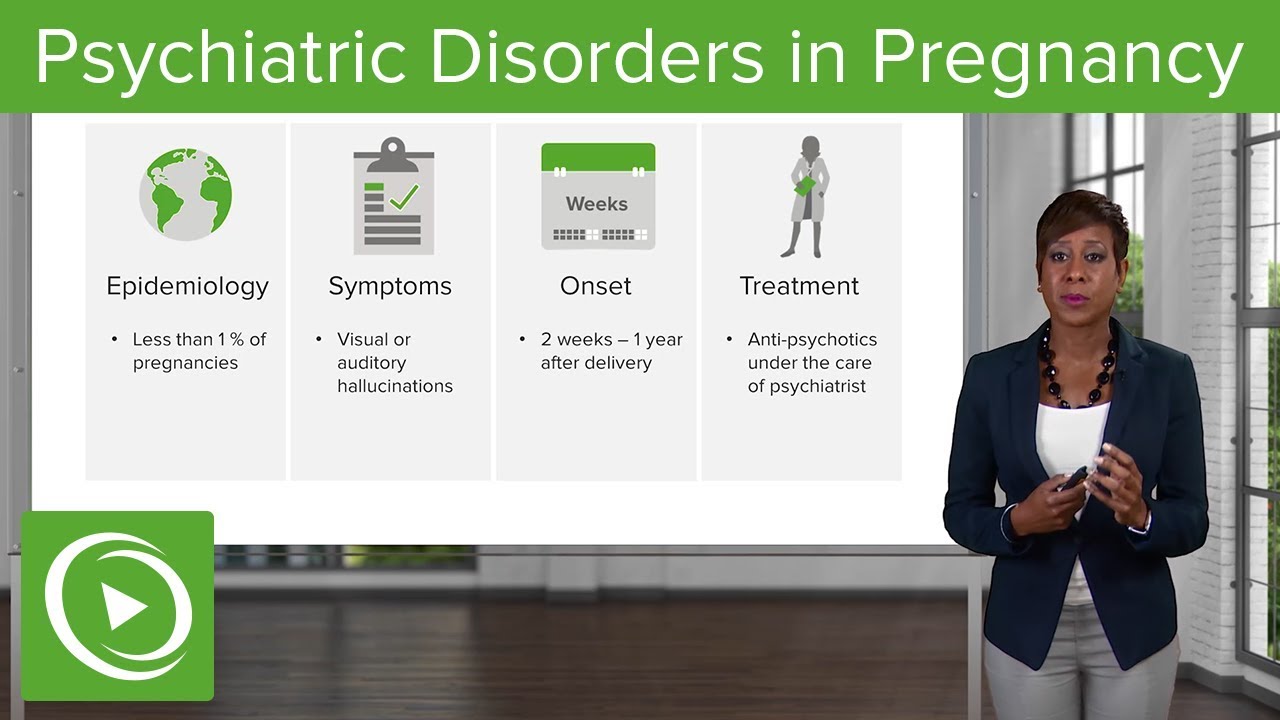Understanding The Importance Of Mental Health In Pregnancy And Postpartum
Pregnancy and postpartum can be exciting times for new mothers, but they can also be a time of significant stress, anxiety, and emotional upheaval. Understanding the importance of mental health in pregnancy and postpartum is crucial to ensure that mothers receive the support and care they need.
Author:Suleman ShahReviewer:Han JuMar 13, 20235.4K Shares249.1K Views

Pregnancy and postpartum can be exciting times for new mothers, but they can also be a time of significant stress, anxiety, and emotional upheaval. Understanding the importance of mental health in pregnancy and postpartumis crucial to ensure that mothers receive the support and care they need.
The Impact Of Pregnancy And Postpartum On Mental Health
Pregnancy and postpartum can bring about significant changes in a woman's life. The hormonal changes, physical changes, and demands of caring for a new baby can all contribute to stress, anxiety, and depression.
Some women may also experience postpartum psychosis, which is a severe and potentially life-threatening condition.
It is essential to note that mental healthconditions can arise at any point during pregnancy and the postpartum period. Some women may experience anxiety and depression during pregnancy, while othersmay develop these conditions in the months following childbirth.
Understanding The Importance Of Mental Health In Pregnancy And Postpartum - Recognizing The Signs
It is crucial to recognize the signs of mental healthissues during pregnancy and postpartum. Common symptoms include feelings of sadness, irritability, anxiety, and difficulty sleeping.
Some women may also experience intrusive thoughts, have trouble bonding with their babies, or feel a sense of guilt or shame.
It is essential to note that experiencing these symptoms does not mean that a woman is a bad mother or that she is weak. Mental health issues during pregnancy and postpartum are common, and seeking help is a sign of strength.
The Importance Of Seeking Help
Seeking help for mental health issues during pregnancy and postpartum is essential. Untreated mental health conditions can have long-lasting effects on both the mother and the baby.
For the mother, untreated mental health conditions can lead to ongoing anxiety, depression, and even post-traumatic stress disorder (PTSD). These conditions can impact the mother's ability to care for her baby and can affect her relationships with her partner and family.
For the baby, exposure to maternal stress and depression can have significant consequences on their development.
Studies have shown that babies exposed to maternal stress and depression may have a higher risk of developmental delays, cognitive impairment, and behavioral problems.
Getting The Right Support
There are many resources available to help women during pregnancy and postpartum. These include healthcare providers, mental health professionals, and support groups. It is essential to seek out the right support to address any mental health issues.
Healthcare providers, including obstetricians and midwives, should screen women for mental health issues during pregnancy and postpartum. They can provide referrals for mental health professionals who specialize in treating women during this period.
Mental health professionals, including therapists and psychiatrists, can provide evidence-based treatments for mental health conditions, including cognitive-behavioral therapyand medication management.
Support groups can be a valuable resource for women experiencing mental health issues during pregnancy and postpartum.
These groups can provide a sense of community and a safe space for women to share their experiences and receive support from others who understand what they are going through.
Caring For Yourself During Pregnancy And Postpartum
In addition to seeking out the right support, it is essential for women to care for themselves during pregnancy and postpartum. This includes getting enough sleep, eating a healthy diet, and engaging in regular exercise.
It is also essential to take time for self-care activities, such as taking a relaxing bath, reading a book, or spending time with friends. Self-care activities can help reduce stress and improve mental health.
Importance Of Mental Health During Pregnancy
The importance of mental health during pregnancy cannot be overstated. Pregnancy is a time of significant physical, emotional, and social changes, which can put a great deal of stress on a woman's mental health.
It is essential for women to prioritize their mental health during this time, as untreated mental health conditions can have long-lasting effects on both the mother and the baby.
Studies have shown that women who experience mental health issues during pregnancy are at a higher risk of experiencing postpartum depression and anxiety.
Additionally, untreated mental health conditions during pregnancy can lead to ongoing anxiety, depression, and even post-traumatic stress disorder (PTSD) for the mother.
These conditions can impact the mother's ability to care for her baby and can affect her relationships with her partner and family.
For the baby, exposure to maternal stress and depression can have significant consequences on their development.
Studies have shown that babies exposed to maternal stress and depression may have a higher risk of developmental delays, cognitive impairment, and behavioral problems.
It is crucial for women to recognize the signs of mental health issues during pregnancy and seek out the right support. This can include healthcare providers, mental health professionals, and support groups.
Healthcare providers, including obstetricians and midwives, should screen women for mental health issues during pregnancy and postpartum, and provide referrals for mental health professionals who specialize in treating women during this period.
In addition to seeking out the right support, women can prioritize their mental health during pregnancy by practicing self-care activities such as getting enough sleep, eating a healthy diet, and engaging in regular exercise.
Self-care activities can help reduce stress and improve mental health. Overall, prioritizing mental health during pregnancy is essential for the health and well-being of both the mother and the baby.
By recognizing the signs of mental health issues and seeking out the right support, women can promote good mental health and well-being for themselves and their babies.
Impact Of Maternal Mental Health On Child Development
Maternal mental health has a significant impact on child development, particularly during pregnancy and the first years of a child's life. When a mother experiences mental health issues during pregnancy, it can impact the baby's development in several ways. For example:
Prenatal Stress
Stress and anxiety during pregnancy can lead to increased levels of cortisol (a stress hormone) in the mother's body.
These elevated levels of cortisol can cross the placenta and affect the baby's developing brain, leading to changes in the baby's behavior, emotional regulation, and cognitive development.
Premature Birth
Women with mental health conditions, such as depression or anxiety, are more likely to deliver prematurely. Premature birth is associated with a higher risk of developmental delays, cognitive impairment, and behavioral problems.
Postpartum Depression
Mothers who experience postpartum depression may have difficulty bonding with their baby, leading to disruptions in the baby's emotional development.
Attachment
Maternal mental health conditions can affect a mother's ability to form a secure attachment with her baby. A secure attachment is critical to a child's emotional and social development.
Parenting Practices
Mothers with mental health conditions may have difficulty providing consistent and responsive care to their babies. Inconsistent and unresponsive parenting practices can impact a child's emotional and behavioral development.

Psychiatric Disorders in Pregnancy – Obstetrics | Lecturio
Genetics
Mental health conditions, such as depression and anxiety, have a genetic component, and children of mothers with these conditions may be at higher risk of developing mental health issues themselves.
It is important to note that not all children of mothers with mental health conditions will experience negative outcomes.
However, research suggests that maternal mental health plays a significant role in a child's development and highlights the importance of addressing mental health issues in mothers.
Supporting maternal mental health is essential for promoting positive child development outcomes.
This includes providing access to mental health services, encouraging mothers to seek help when needed, and providing education and resources to promote good mental health practices.
People Also Ask
What Are The Signs Of Postpartum Depression?
The signs of postpartum depression may include feelings of sadness, irritability, and anxiety, changes in sleep or appetite, and difficulty bonding with the baby.
How Can I Manage Stress During Pregnancy?
Managing stress during pregnancy can include practicing relaxation techniques, engaging in regular exercise, and getting enough sleep.
What Resources Are Available For Women Experiencing Maternal Mental Health Issues?
There are several resources available for women experiencing maternal mental health issues, including mental health professionals, support groups, and online resources.
Conclusion
Understanding the importance of mental health in pregnancy and postpartum is crucial for the health and well-being of both the mother and the baby.
Recognizing the signs of mental health issues and seeking out the right support is essential to ensure that women receive the care they need. Caring for oneself during this time is also crucial to promote good mental health and overall well-being.
It is important to remember that mental health issues during pregnancy and postpartum are common and that seeking help is a sign of strength. With the right support and care, women can navigate the challenges of this period and emerge with good mental health and a strong bond with their new baby.
Jump to
The Impact Of Pregnancy And Postpartum On Mental Health
Understanding The Importance Of Mental Health In Pregnancy And Postpartum - Recognizing The Signs
Caring For Yourself During Pregnancy And Postpartum
Importance Of Mental Health During Pregnancy
Impact Of Maternal Mental Health On Child Development
People Also Ask
Conclusion

Suleman Shah
Author
Suleman Shah is a researcher and freelance writer. As a researcher, he has worked with MNS University of Agriculture, Multan (Pakistan) and Texas A & M University (USA). He regularly writes science articles and blogs for science news website immersse.com and open access publishers OA Publishing London and Scientific Times. He loves to keep himself updated on scientific developments and convert these developments into everyday language to update the readers about the developments in the scientific era. His primary research focus is Plant sciences, and he contributed to this field by publishing his research in scientific journals and presenting his work at many Conferences.
Shah graduated from the University of Agriculture Faisalabad (Pakistan) and started his professional carrier with Jaffer Agro Services and later with the Agriculture Department of the Government of Pakistan. His research interest compelled and attracted him to proceed with his carrier in Plant sciences research. So, he started his Ph.D. in Soil Science at MNS University of Agriculture Multan (Pakistan). Later, he started working as a visiting scholar with Texas A&M University (USA).
Shah’s experience with big Open Excess publishers like Springers, Frontiers, MDPI, etc., testified to his belief in Open Access as a barrier-removing mechanism between researchers and the readers of their research. Shah believes that Open Access is revolutionizing the publication process and benefitting research in all fields.

Han Ju
Reviewer
Hello! I'm Han Ju, the heart behind World Wide Journals. My life is a unique tapestry woven from the threads of news, spirituality, and science, enriched by melodies from my guitar. Raised amidst tales of the ancient and the arcane, I developed a keen eye for the stories that truly matter. Through my work, I seek to bridge the seen with the unseen, marrying the rigor of science with the depth of spirituality.
Each article at World Wide Journals is a piece of this ongoing quest, blending analysis with personal reflection. Whether exploring quantum frontiers or strumming chords under the stars, my aim is to inspire and provoke thought, inviting you into a world where every discovery is a note in the grand symphony of existence.
Welcome aboard this journey of insight and exploration, where curiosity leads and music guides.
Latest Articles
Popular Articles
